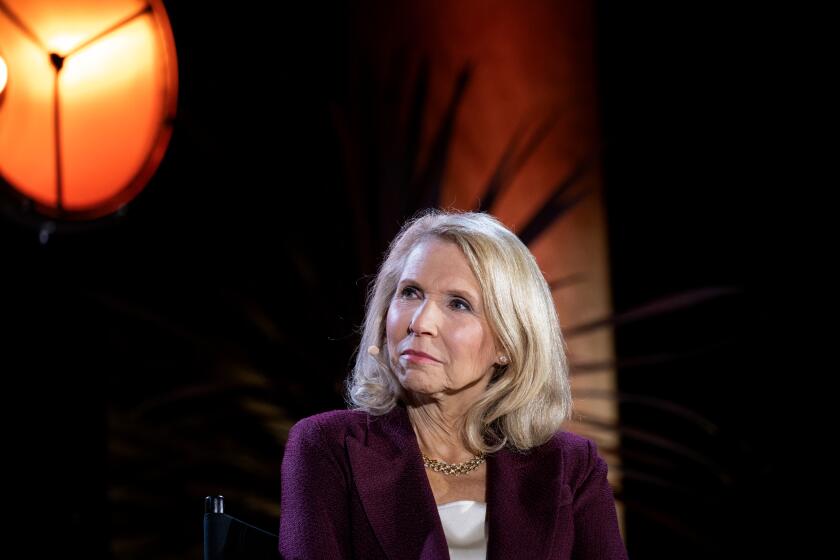So the Paramount and Skydance deal is back on track. What happened and what’s next?

- Share via
A storied movie studio and broadcast network are poised for a generational changing of the guard that could dramatically reshape the entertainment business.
Shari Redstone and her family on Tuesday accepted tech scion David Ellison’s proposed $2.4-billion purchase of their investment firm, National Amusements Inc., commonly known as NAI, which owns the controlling shares of beleaguered media company Paramount Global.
The Redstone family submitted the offer from Ellison’s Skydance Media to Paramount’s special board committee, which now must accept or reject it. The struggling media giant owns CBS, the Paramount Pictures film studio and cable channels MTV, Nickelodeon and Comedy Central.
On Wednesday, Paramount board members began evaluating the offer, a version of which they came close to approving three weeks ago before Redstone got cold feet and called off the talks. Now the question hangs over the company: Is the deal for real this time, and what happens once it closes?
“It’s feeling a lot like Groundhog Day,” analyst Jamie Lumley of research firm Third Bridge said in an emailed statement. “Renewed hope that both parties will be able to get a deal over the line is being tempered by concerns that we’ve been here before and it’s unclear whether all outstanding issues have been addressed.”
The prize now finally feels within reach for Ellison, the 41-year-old son of billionaire Larry Ellison, co-founder of Oracle Corp. The breakthrough came this week after months of high drama, including tumultuous behind-the-scenes negotiations, boardroom conflict and two spectacular U-turns by Redstone.
Redstone abruptly pulled the plug on Ellison’s deal June 11, just as it appeared the deal was on the edge of completion. Her shifting stance startled industry observers — and Paramount insiders — because she had been the biggest champion of Ellison’s bid, even sidelining the deal’s detractors who had been standing in the way, including ousting former Paramount Chief Executive Bob Bakish.
After Redstone abandoned the talks, Ellison and his bidding partners spent about a week regrouping. Ellison then reached out to Redstone to try again, according to two knowledgeable people not authorized to discuss the internal process.
Skydance Media CEO David Ellison, son of billionaire Larry Ellison, has emerged as a strong contender to take over the iconic Paramount studios.
Ellison and his backers RedBird Capital Partners, private equity firm KKR and Larry Ellison had agreed to sprinkle in more sweeteners — including another $50 million earmarked for the Redstones’ NAI — in an attempt to restore trust and get deal talks back on track, according to three people familiar with the process.
All in, the Skydance-Paramount deal is valued at about $8.4 billion.
Selling National Amusements would net the Redstone family $1.75 billion, after the firm’s debts are paid. In addition, Skydance and its financial partners have agreed to provide a $1.5-billion cash infusion to help Paramount pay down some of its debt to improve its balance sheet. Those payments would be made after the deal closes, knowledgeable people said.
The arrangement also would set aside $4.5 billion to buy shares belonging to Paramount’s B-Class, or nonvoting, investors who might be eager to exit.
The mogul’s stunning eleventh-hour reversal came after a financial deal had been reached with David Ellison’s Skydance Media. For now, the storied media company will attempt to go it alone.
Wall Street cheered the new twist Wednesday, sending Paramount shares up nearly 7% to $11.46.
As part of the transaction, David Ellison intends to merge privately held Skydance — the 14-year-old Santa Monica movie, television and gaming firm behind Paramount blockbuster “Top Gun: Maverick” — with Paramount.
The next step is for Paramount’s board to approve the deal. The arrangement would also require the consent of federal regulators. That process would take months.
Momentum grew in recent days because both sides wanted to clinch a deal before next week’s annual Sun Valley, Idaho, media mogul conference, which draws such heavy hitters as Walt Disney Co. Chief Executive Bob Iger, Amazon CEO Andy Jassy and founder Jeff Bezos, news baron Rupert Murdoch — and Redstone.
The Skydance group also agreed to strengthen provisions to try to shield the Redstone family from shareholder lawsuits related to the deal, knowledgeable people said. Some nonvoting shareholders have long objected to the Ellison proposal, saying it benefited the Redstone family at the expense of everyday investors.
Rather than leading Paramount to reclaim its place among industry titans, Redstone’s tenure atop the company has been marred by miscalculations and setbacks.
Wrangling over indemnification proposals proved fraught in the days before the deal collapsed in early June.
At one point, Redstone sought the ability to allow regular shareholders to have a say with a nonbinding vote. But that was a nonstarter for Skydance and RedBird. In the end, the two sides agreed on a 45-day “go shop” period, allowing Paramount to field other offers.
It’s not clear whether there are others interested in buying Paramount whole, largely because of the severe challenges facing the cable programming business. The company’s cable channels, once industry leaders, have seen their audiences flee in the shift to streaming and bountiful on-demand offerings, including from Netflix and Hulu.
Apollo Global Management and Sony Pictures Entertainment had expressed interest in parts of Paramount. Sony wanted the Paramount Pictures studio and its rich library, which includes the “Mission: Impossible” and “Top Gun” franchises. Warner Bros. Discovery was interested, in large part, in buying CBS in a bid to strengthen its television portfolio, including TNT and CNN.
But even under Ellison, the company may need to consider unloading certain assets, analysts said. Paramount has reportedly restarted the process of potentially selling BET, for example.
“I think what we can expect is a stabilization of its balance sheet,” said Laurent Yoon, senior analyst at Bernstein. “If you’re able to stabilize the balance sheet, it helps them to invest in growth. But even if they invest in growth, they’re not going to see the fruits of that in the near term. It will take time.”
Other potential buyers of National Amusements surfaced in recent months, complicating Redstone’s decision.
She has overseen the family’s empire since her father, Sumner Redstone, began dealing with health issues eight years ago. He died in 2020.
The other suitors — former top Seagram and Warner Music executive Edgar Bronfman Jr. and Hollywood producer Steven Paul (“Ghost in the Shell,” “Baby Geniuses”) — separately had proposed paying the family more than $1.75 billion.
Controlling shareholder Shari Redstone hasn’t consented to the deal. Competing offers have come in for National Amusements, but Redstone has long favored Ellison.
Challenges amid the rapidly changing industry in many ways prompted Redstone to part with her beloved family heirloom. The decision to let go was a difficult one, according to people close to the mogul. Her family has long taken great pride in its ownership of Paramount, formerly known as Viacom.
Redstone’s adult children — who are in line to inherit the family’s fortune — had initially advocated for the Skydance deal, according to two people familiar with the matter but not authorized to speak publicly.
In addition to the family’s Paramount shares, National Amusements includes a regional movie theater chain founded by Sumner Redstone’s father, Mickey, a former linoleum floor salesman, during the Great Depression.
Times staff writer Samantha Masunaga contributed to this report.
More to Read
Inside the business of entertainment
The Wide Shot brings you news, analysis and insights on everything from streaming wars to production — and what it all means for the future.
You may occasionally receive promotional content from the Los Angeles Times.















